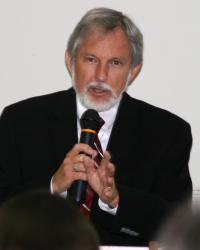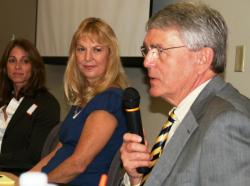Int'l Ed Week spurs ideas for college ‘globalization'
View related video: “Internationalizing the College of Education” (15:56)
Posted Dec. 14, 2010
It takes more than a bite of hummus to understand the Middle East, or a sip of a margarita to comprehend Mexico.
 College of Education students need more exposure to diversity through activities like studying abroad, said a panel of four College of Education professors, joined by UF International Center Dean David Sammons (pictured, right). The group discussed strategies for internationalizing UF as part of the college’s recent International Education Week festivities.
College of Education students need more exposure to diversity through activities like studying abroad, said a panel of four College of Education professors, joined by UF International Center Dean David Sammons (pictured, right). The group discussed strategies for internationalizing UF as part of the college’s recent International Education Week festivities.
“A challenge is the mindset that study abroad is a luxury,” said Sammons. “We need to think of it as almost a routine part of higher education.”
Sammons said about 2,400 UF students study abroad each year – less than 5 percent of the student body. This must improve because international work is at the core of higher education and, for education students, studying abroad helps future teachers prepare to deal with ethnically diverse classrooms, he said.
Students studying in other countries take a new perspective to those nations and bring back a new perspective to the college after their visits, said Cerecie West-Olatunji, associate professor in counselor education. She often organizes outreach trips abroad with her students and said it’s difficult to leave a foreign country without feeling a connection to it.
“It’s difficult to have a drive-by experience, where you go have some tacos, come back and say ‘I had a good time,’” she said. “We bring something and take something away, and we are forever connected in some way.”
There are many students who would thrive abroad but can’t afford to go, West-Olatunji said. Students often aren’t aware that scholarship funds are available – for example, Bright Futures scholarship money can even apply to studying abroad. There also are professional internships, exchange programs, work abroad and service-learning opportunities, Sammons said. Interested students can make an appointment with an advisor at the UF International Center for more information.
Besides sending more students abroad, the College of Education also would benefit from making changes at home. UF needs to think about transcending borders, Sammons said. “Borders aren’t just lines on a map.”
Our country is divided by gender, religious, racial and language barriers, he said, which is why multi-cultural engagement should start as early as elementary school. Sammons told the crowd of about 50 students and faculty how he once brought home a Chinese coin for his young son, who threw it on the ground and bellowed, “That’s not money!” It is the responsibility of future teachers to make young students aware that the world consists of different types of people and cultures, he said.
 All teachers will encounter students with international backgrounds, and teachers who speak a second language are most prepared for this, said Maria Coady, assistant professor in ESOL/bilingual education.
All teachers will encounter students with international backgrounds, and teachers who speak a second language are most prepared for this, said Maria Coady, assistant professor in ESOL/bilingual education.
The college could diversify its curriculum by adding requirements such as ESOL courses, said Linda Jones, associate professor in science and environmental education. Many institutions already have models like these in place, and UF should contact them for guidance on instituting such programs.
Most importantly, we must welcome international students, said Jones (pictured, above, flanked by fellow panel members Maria Coady, left, and Thomas Oakland).
“Americans are raised thinking that America is all that matters,” JOnes said. “So sometimes it’s intimidating for Americans to have international students in class, because they start to realize how much they don’t know.”
There is an African chorus on campus, said Sammons, and a third of the members aren’t even African. UF needs to build a sense of a community like this group, where international students learn from Americans and vice versa.
“We don’t need passports to deal with these problems,” he said.
* * *
CONTACTS Writer: Jennifer Tormo, intern, COE News & Communications; jtormo@coe.ufl.edu




